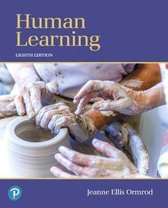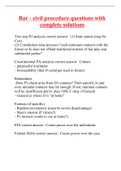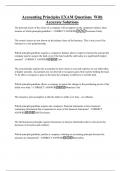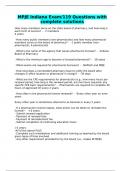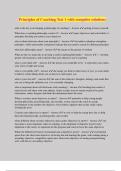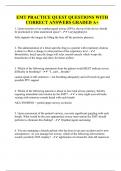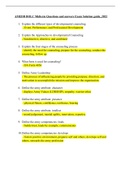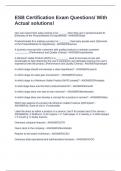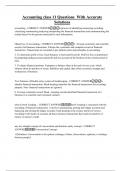Literature & Notes
*SV&LD: the literature or notes have been read and summarised.
*x: not summarised due to absence or irrelevance.
1.1 Lecture I SV&LD
1.2 Chapter 1 Ormrod SV&LD
2.1 Lecture II SV&LD
2.2 Chapter 3+4 Ormrod SV&LD
3.1 Lecture III SV&LD
3.2 Chapter 6+7 Ormrod SV&LD
4.1 Lecture IV SV&LD
4.2 Chapter 9 Ormrod SV&LD
SV&LD
SV&LD
5.1 Lecture V SV&LD
5.2 Chapter 10 + 11 + 12 Ormrod SV&LD
6.1 Lecture VI SV&LD
6.2 Van Gog, T., Rummel, N., & Renkl, A. (2019). Learning How to Solve SV&LD
Problems by Studying Examples. In J. Dunlosky & K. Rawson (Eds.),
The Cambridge Handbook of Cognition and Education (Cambridge
Handbooks in Psychology, pp. 183-208). Cambridge: Cambridge
University Press. Doi:10.1017/9781108235631.009 Link:
https://www.cambridge.org/core/books/cambridge-handbook-of-cogniti
on-andeducation/3983FDC96F4E72A7F57445406E10F4F4 or
https://sci- hub.se/10.1017/9781108235631.009
7.1 Lecture VII SV&LD
7.2 Chapter 15 + 16 Ormrod SV&LD
8.1 Lecture VIII SV&LD
Louise Beuze - Educational Sciences - Educational Psychology - UU 2021-2022
1
, 8.2 Bakker, A., & Akkerman, S.F. (2014). A boundary-crossing approach SV&LD
to support students’ integration of statistical and work-related
knowledge. Educ Stud Math,86, 223–237.
Carraher, T. N., Carraher, D. W., & Schliemann, A. D. (1985). SV&LD
Mathematics in the streets and in schools. British Journal of
Developmental Psychology, 3(1), 21-29
Week 1
Lecture I
Important questions to ask while studying educational psychology:
● Who is learning?
○ Age and development;
○ Abilities (or specific problems);
○ Dispositions;
■ Personality;
■ Particular interests and motivation;
● What are they learning?
○ Learning material;
○ Learning domain;
○ Prior knowledge;
○ Perceived ability to learn the material;
● How are they learning it?
○ Alone, or with others;
○ Use of learning and memorization techniques;
○ Through discovery or by other means;
○ Using (or not using) technology;
● What is the effect of learning?
○ When do we consider learning to be ‘effective’?;
○ Forgetting: do we really forget things?;
○ Transfer of knowledge: can you apply your knowledge to other situations?
The scientific method as an ongoing process:
Louise Beuze - Educational Sciences - Educational Psychology - UU 2021-2022
2
,Educational research is used to explore issues, shape policies, and improve practice. This
is studied through qualitative and quantitative methods. Quantitative methods are the most
common methods, which are characterized by counting and measuring, comparing
conditions, and statistical analysis. Qualitative research is more about the use of surveys,
interviews, or observations. This allows for more in-depth research and is great to use when
the research regards a more sensitive or subjective interpretation.
Communication is one of the most important things in the scientific world. This is mostly
done by publishing articles in scientific journals and peer reviews. This is a long-term
process. Other ways are through conference proceedings, presentations, magazines, blogs,
vlogs or even social media. To communicate in the same ‘language’, the APA style is used
in scientific articles.
Chapter 1 - Ormrod
How can ‘learning’ be defined?
Ormrod describes learning as “a long-term change in mental representations or
associations as a result of experience.” In this definition, the factor ‘behavior’ is not
mentioned, while the result of learning can often be noticed by someone’s behavior.
Human learning can either be researched by basic research (tightly controlled conditions)
or applied research (‘real-world’ tasks and settings).
Research findings led to principles, which identify certain factors and what influence they
have on learning. Principles are most useful when they have broad applicability.
Theories are more about the explanations underlying the mechanisms involved in learning,
instead of what those factors are.
Types of learning research
Louise Beuze - Educational Sciences - Educational Psychology - UU 2021-2022
3
, The first studies on learning went from the structuralism and functionalism perspectives,
which both used the method called introspection. This meant that people were asked to
look inside their heads. This method was criticized for the lack of scientific rigor and
replaced by the methods of behaviorism. A focus on people’s behaviors (responses) and
environmental events (stimuli) were the main ideas of this perspective. In the 1940s, a new
perspective was constructed: the social learning theory. Modeling, learning from
watching, and imitating what other people do, is a core concept of this perspective.
Later on, the focus on behavior was shifted to a broader focus, including cognitive
psychology (cognitivism). In the social cognitive theory, cognitive processes were
incorporated into scientific research. The contextual theories take it a step further, by
taking the factors intimately tied to our bodies (physical actions/emotions) into account.
When multiple layers of context are presented, this is called a system theory.
Cognitive neuroscience focuses on the influence on brain development, caused by
behavior and learning experiences.
Louise Beuze - Educational Sciences - Educational Psychology - UU 2021-2022
4


